How a bicycle can change a refugee’s life
We often talk about cycling as a lifestyle choice but for refugees bikes are a tool for moving around and a key that unlocks healthcare, support and employment, reports Sean Russell


Wissam Haddad is tall and skinny and has an impish smile and bright eyes. I met him by the red brick railway arches in Deptford, south London, one cold, sunny morning in late November. He held out his hand for me to shake and introduced himself confidently and seemed excited to tell me his story and talk about cycling.
We walked along the arches as the occasional overground passed by overhead and he told me he lived in Hackney, and we swapped stories of the borough; about where to buy the best Turkish bread and which places were nice to cycle in. We looked into each of the little businesses and studios within the railway arches and eventually we found a workshop filled with bicycles, tools and tyres and a team of mechanics who welcomed us in from the cold and let us sit down at a table to talk.
Twenty-eight-year-old Haddad, who prefers I don’t use his real name, hadn’t ridden a bike until he arrived in the UK in January 2020. He felt it was unsafe to do so in Damascus, where he is from, and so never learned. And, while London has its problems when it comes to cycling, he was able to learn to ride here safely and in doing so found a certain type of liberation that other bike riders will know.
“Since I got the bike, I feel freer to move around,” he told me with his perpetual smile. “I can see my friends and I can go to places I just couldn’t have gone by public transport because of the expense. Suddenly London felt so much smaller than it is.”
He told me that the importance and joy of having a bike was laid bare to him recently as he sought a new home in Hackney. Instead of paying to move back and forth as he visited rooms and properties around the borough, he simply got on his bike and pedalled off, up and down the streets searching out these new places with no costs to worry about and no timetables to adhere to. It was real urban freedom.
Haddad is a dancer and choreographer and trains in contemporary dance. He is also an asylum seeker from Syria and he is in the UK alone. His mother is still in Damascus and, although he hasn’t seen her for over two years, they keep in touch with regular video calls. His sister, meanwhile, is now in Germany. In 2019, when he was given the chance to study his MA in dance across Europe, including stints in Norway, Hungary, France, and ending with a term in London, he took it and once he graduated in 2020, he applied for asylum, explaining to the Home Office on the phone that he simply couldn’t go back to Syria during the ongoing humanitarian crisis.
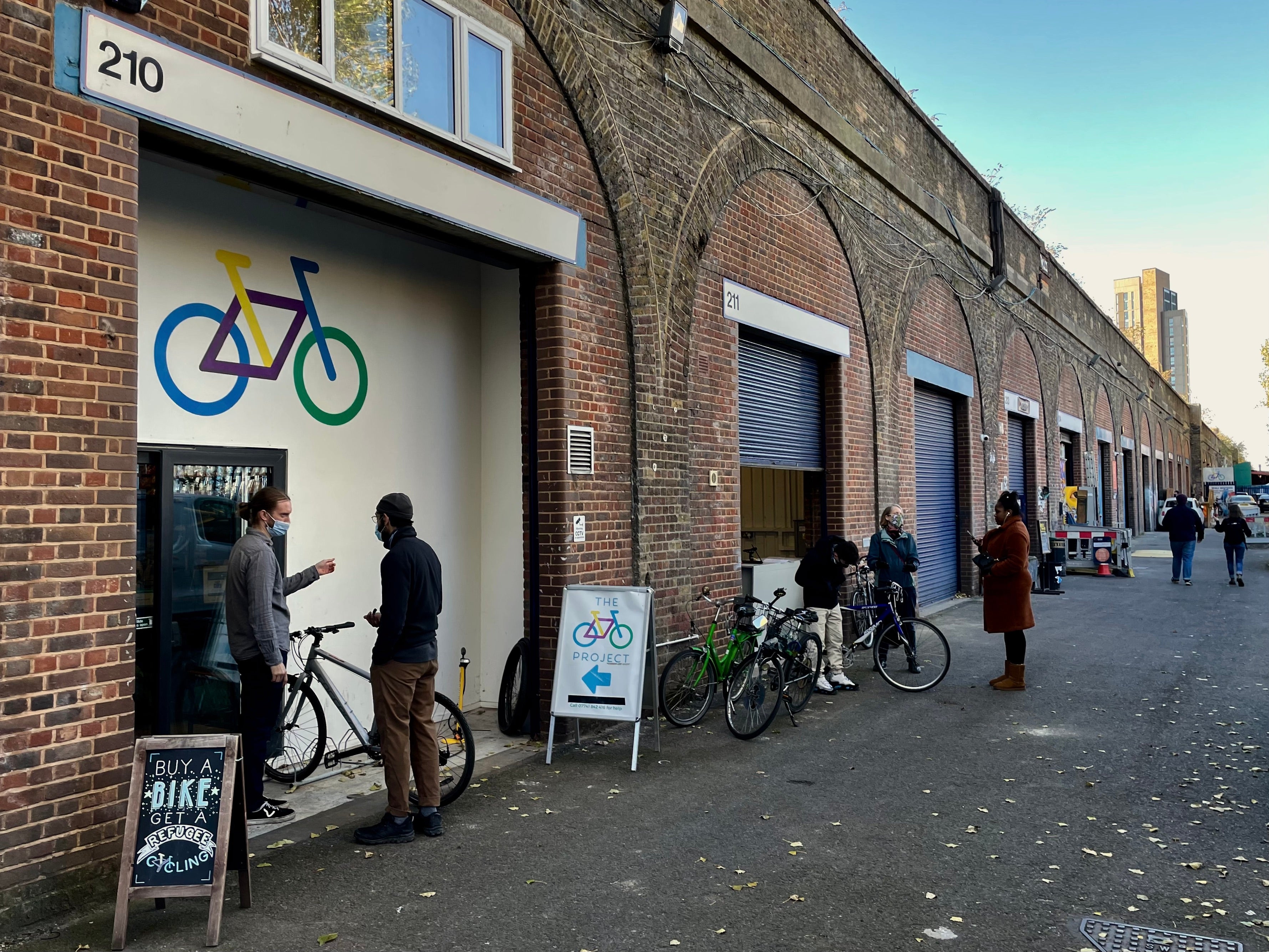
He didn’t plan on staying in London for so long, but now feels he could live here for many years to come to build his career in dance. It was, he told me, “a dream come true”. And while he has recently developed a habit of not thinking too far into the future, preferring instead to embrace opportunity as it comes along and understanding better than many that things can change in an instant, he said he would be happy to stay here and follow his ambition – if his asylum application is accepted.
In the meantime, he is allowed to work while he waits, and so has a job as a freelance choreographer and dance teacher in Kilburn and Dalston, and cycles there and back as often as he needs. Cycling has been key to building a new life, he says, and while he misses Syria and his family and friends and the culture, he feels he cannot go back, not yet, and possibly not for a while.
Behind every refugee, indeed behind every cyclist, is a story. These are people seeking a better life, and cycling is just one way they can make a real go at beginning to build something new
The crisis in Syria is well known. Since the civil war began in 2011, 13.5 million people have been forcibly displaced, 6.8 million of which have sought refuge in countries across the world, including the UK. While in recent weeks and months the desperate channel crossings have taken centre stage – despite making up only 3 per cent of refugee arrivals – and discussions have surrounded how we as a nation can help these people, or, in some cases, deter these people, the stories of those that have left their homes in search of a new life are often forgotten or dehumanised, reduced to numbers of arrivals, or, sadly, of deaths.
This does not just apply to people of Syria, but to those fleeing Iran, Iraq, Albania, Eritrea, Afghanistan and Sudan among others. There are many people looking to start new lives, and Haddad is just one. And it was receiving his first bicycle that really helped him build his new life in London.
The Bike Project is a charity based in London – with a site in Birmingham – which aims to provide bicycles to refugees for free. Usually, an asylum seeker is referred to the charity by one of their referral partners such as the Red Cross, paperwork is filled out and a bike is handed over along with a bag including a helmet, lights, gloves and everything a new cyclist might need. They are also given free services and parts when their bikes need it. It is an important lifeline to more than 2,000 asylum seekers every year.
Each year there are as many 27,000 bicycles abandoned in London alone, that number increases if you take into consideration bikes just left to rust in sheds and hallways and garages. With over 37,000 asylum applications to the UK each year, and increasing, it is the mission of the Bike Project to get their hands on these bikes – and many more – through people’s kind donations, service them and get the bicycles into the hands of those who really need them.
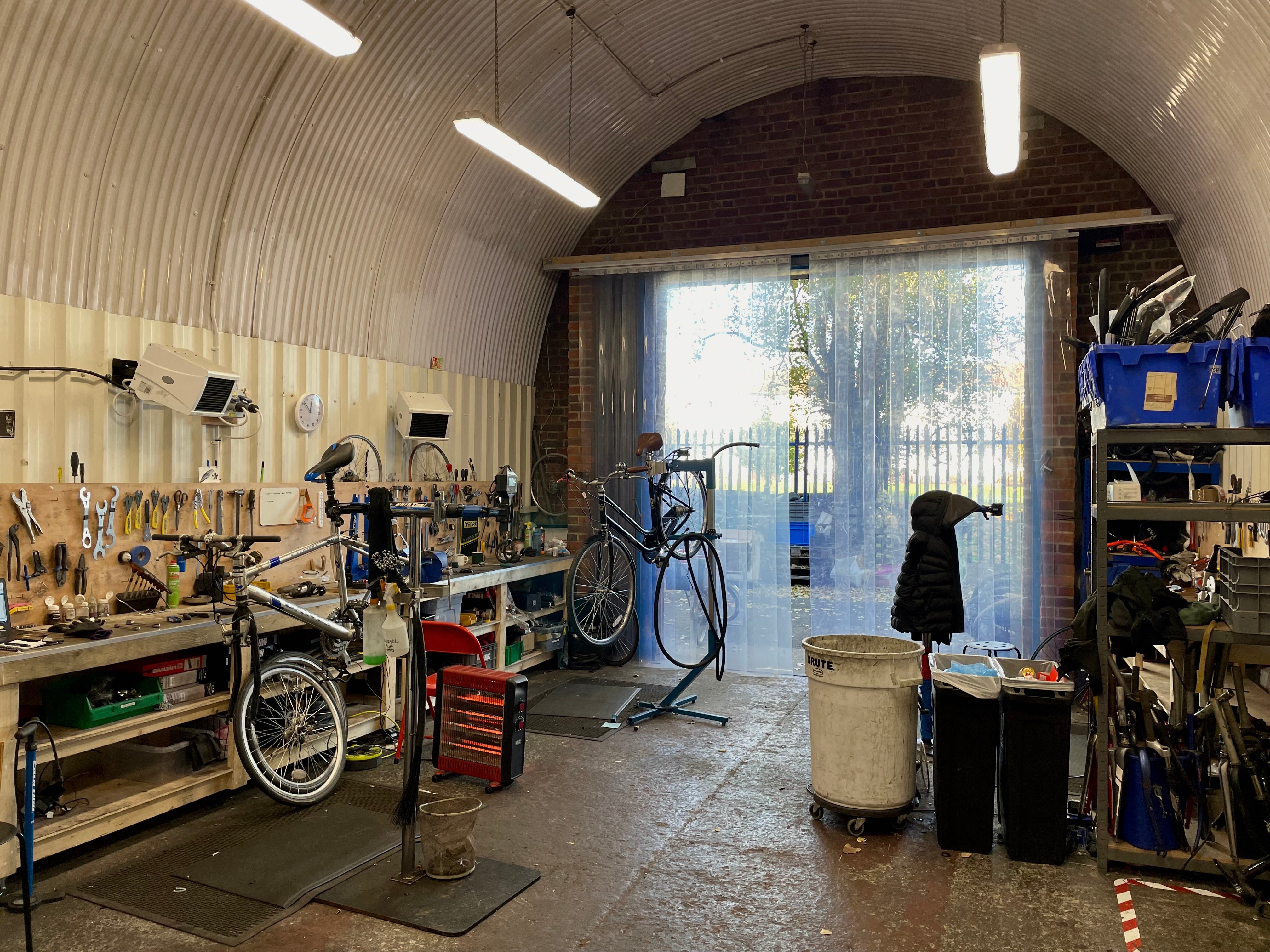
And there are many who really do need them. It is easy to think of cycling as a lifestyle choice, but the truth is that for many, their lives and livelihoods rely on bicycles. It is, effectively, their only choice. The average cost of a weekly bus pass, for example, is £21. The tube is even more than that. When people arrive in this country with little – or in some cases nothing – a bike isn’t a luxury, it’s a lifeline, allowing them to pick up food from shops or foodbanks, to search for housing, to access services, to make medical and other appointments. A refugee on asylum support in the UK receives just £39.63 a week, that’s about £5.66 a day. Without a bicycle, this would simply be unaffordable – even with a bike it’s a struggle.
Qerim Nuredini, a Red Cross refugee services manager in Bristol, told me that for many asylum seekers, one of the best things that ever happened was when they were referred to the Bike Project and got a bike.
“It gave them the freedom of travel around the city and enabled them to get access to support that otherwise would have been very difficult to get otherwise.”
When Odunayo Comfort Adeyemi came to this country from Nigeria, she believed she was coming to study diabetes. Her father had died of the disease in 2015, and while it was too late to help him, she wanted to do all she could to help others. She arrived in London in 2015 but she soon found out she wasn’t here to study. She had in fact been a victim of human trafficking.
It’s something she still doesn’t quite understand, but she believes that the traffickers wished to get a man into the country who was illiterate and spoke no English and so she was chosen as a “dependent”. She was tricked into thinking she was coming to the UK to study, but when she arrived, she was abandoned and the course she believed she was attending didn’t exist.
It was two years before she realised she’d been trafficked. On her way home one evening in 2017, at Bromley South railway station, in Kent, she was racially assaulted, physically and verbally. She’d had enough. It wasn’t the first such attack and she was already dealing with being abandoned in London. She went to the police to report the attack and found out she had overstayed her visa and was in fact in the UK illegally. It wasn’t long after this that she was sectioned for her mental health. A charity stepped in and explained that she had been a victim of trafficking and that she could apply for asylum. She couldn’t return to Nigeria, and she had nowhere else to go. She put in her application and was placed in a hostel.

She told me that the food was terrible there, that she often had food poisoning and felt stuck in this room, waiting for her application to be reviewed. She couldn’t work and she had no money to do anything but sit and wait. She says most people just left their rooms to eat and then returned immediately after.
“We have a lot of issues we bring from our countries,” she told me, “and we come here to find freedom and then we are confined to a small space, it all adds to the pressure on our mental wellbeing.”
One day, Adeyemi saw a leaflet in the hostel for the Bike Project’s Pedal Power group. It offered to give her £5 for expenses and a free lunch to come along and learn how to ride a bike with other women. It was the £5 and free lunch that drew her to it, the thought of being able to eat a proper meal even just once a week was too much of a draw but, she says, Pedal Power and the Bike Project transformed her life.
Pedal Power aims to teach refugee women how to cycle. Many come from countries where cycling is not socially acceptable for women and here in the UK is their first chance to try. Adeyemi told me, for example, that in Nigeria cycling is seen as a luxury, a luxury that someone from a poor family such as her own could not afford. Using bicycles provided by the charity, they can join other women to learn how to cycle, socialise, build a community and gain confidence.
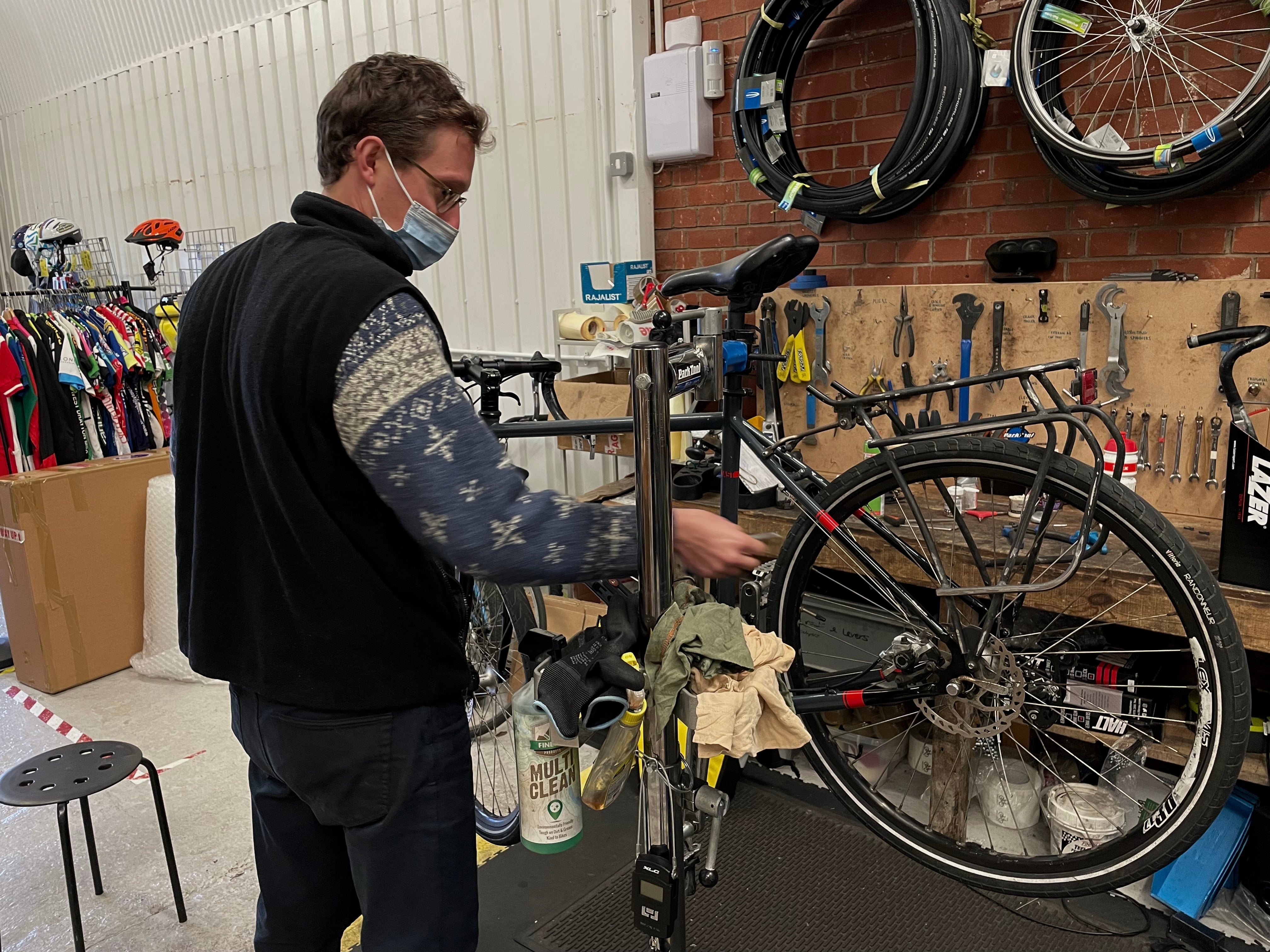
Adeyemi says it became more about integration, and at the end of the training she was asked to volunteer and was given the chance to train as a cycling instructor, a chance she relished. Since then she has also completed a bike mechanics course with the charity, and has become a trustee. She feels she is building a career in cycling and now her asylum application has been accepted this is something she wants to pursue.
“It transformed my life completely,” Adeyemi says. “I was in a completely dark place and my mental health was zero, my physical health was zero and it was through Pedal Power that I started developing a sense of belonging and wanting to get better and wanting to improve my life. So, in the end it was more than £5, it was a transformation, a whole new chapter for me, a new chance to live.”
Jem Stein has a chuckling smile, heavy stubble and thick eyebrows. He was dressed for the cold, cycling in from Kilburn in his silver reflective jacket and hi-vis yellow gloves. He showed me around the workshop where four mechanics worked on bikes and the walls were covered in tyres and tools and then he introduced me to a volunteer who was handing a bicycle over to a young man.
“It’s pick-up time,” he told me. There were five or so people waiting to be served, asylum seekers there to pick up their free bikes. They have given away over 7,500 bikes since they started, the vast majority of which were donated by individuals.
Stein founded the Bike Project in 2013 after graduating and working briefly for another charity. He told me the idea came from an experience he had with an asylum seeker he met while studying at LSE, a man name Adam.

“He was an asylum seeker from Darfur,” Stein said. “He arrived aged 16 without his parents or anyone with him. He applied for asylum and had to live off just £38, wasn’t allowed to work, and was put in rubbish accommodation near Hounslow. One of the big challenges he faced was getting around, so one of the first things I did was get him a bike. That was the first step towards normal living for him. Suddenly he had access to education, healthcare, psychological support and other essential services. That was the main instigator that got me thinking about what I could do.”
Stein set up the Bike Project in his spare time. He sourced old bikes and serviced them and gave them away. When he realised there was scope in this he began to take the finished bikes to a local refugee centre and that was when he realised just how high the demand was and how important cycling was to these people.
Originally asylum seekers would come direct to the Bike Project but now the charity relies on its partners, like the Red Cross, to determine who needs a bike most. This is better, Stein says, because the demand was so high that they ended up with a waiting list which could last months. Using referral partners, that waiting time is cut down to a couple of weeks to a month maximum.
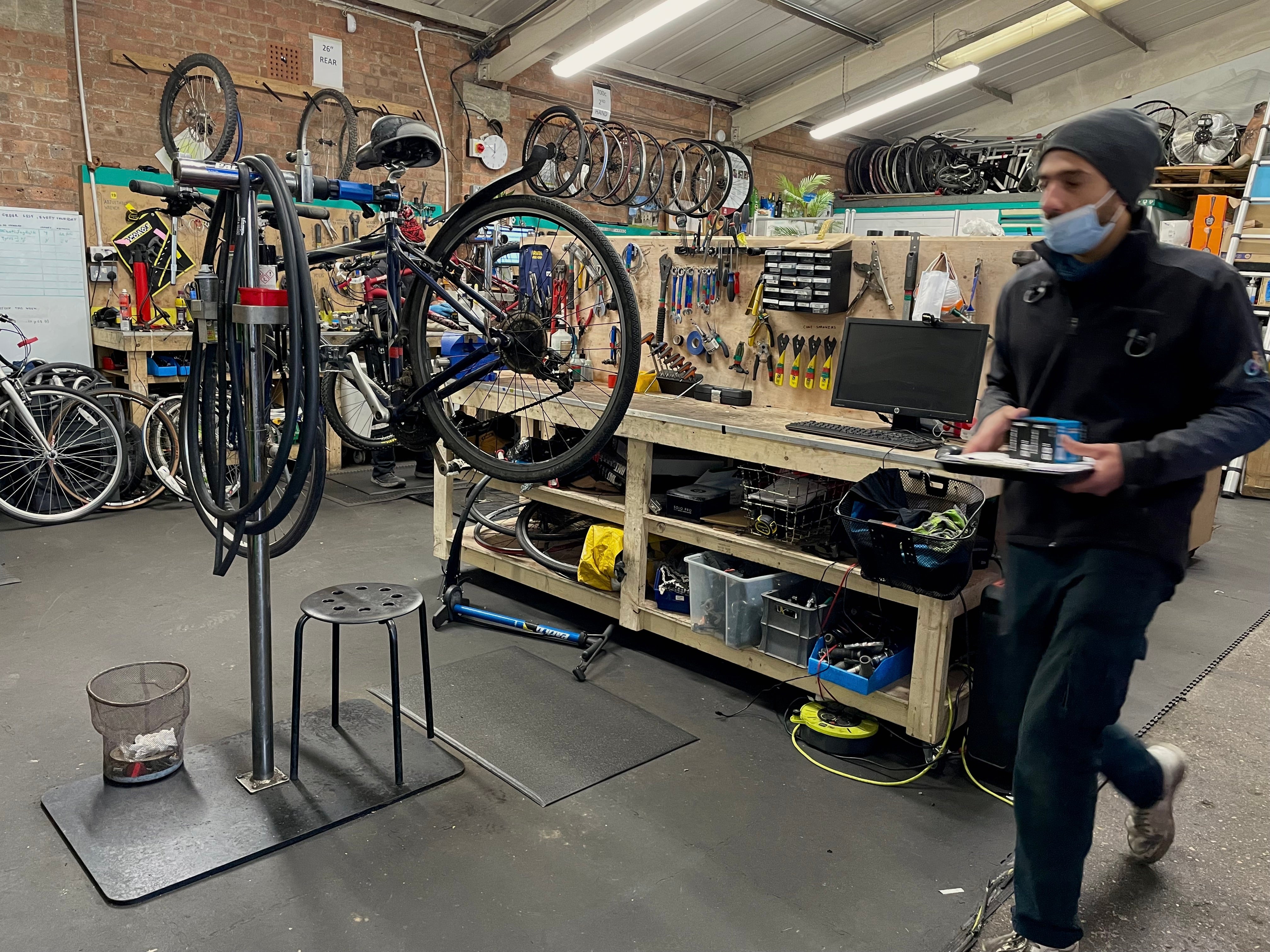
This was Haddad’s experience. He was put in contact by a friend from Syria who helped him fill out the paperwork and then one month later he had a text message telling him to pick up his bike. It was a bit small, so a month later they replaced it with a bigger one. Haddad is hoping that one day he will be able to buy his own bike and then further in the future donate it to the Bike Project to help someone as he has been helped.
“When you see these people get a thing that you love so much, and you see their reaction, it reminds me of why we do what we do,” head mechanic, Callum Harbord, told me as he sat down to do some admin work on his laptop. “It’s the reason we work so hard.”
Harbord was wearing a t-shirt and shorts, even in the cold workshop, but still wore an orange woolly hat and a Gillet. He has been working full-time for the Bike Project for three years. He had worked as a bike mechanic in cycling shops before, but became disillusioned with the big bike brands and customers. He told me about another charity which he volunteered at in Kingston-upon-Thames when he was younger which aimed to get bikes to low-income families and how much he loved it. He was having something of a mid-career crisis, but knew he still loved bicycles. He Googled “volunteer bike workshop” one day and came across the Bike Project and knew he wanted to work there.
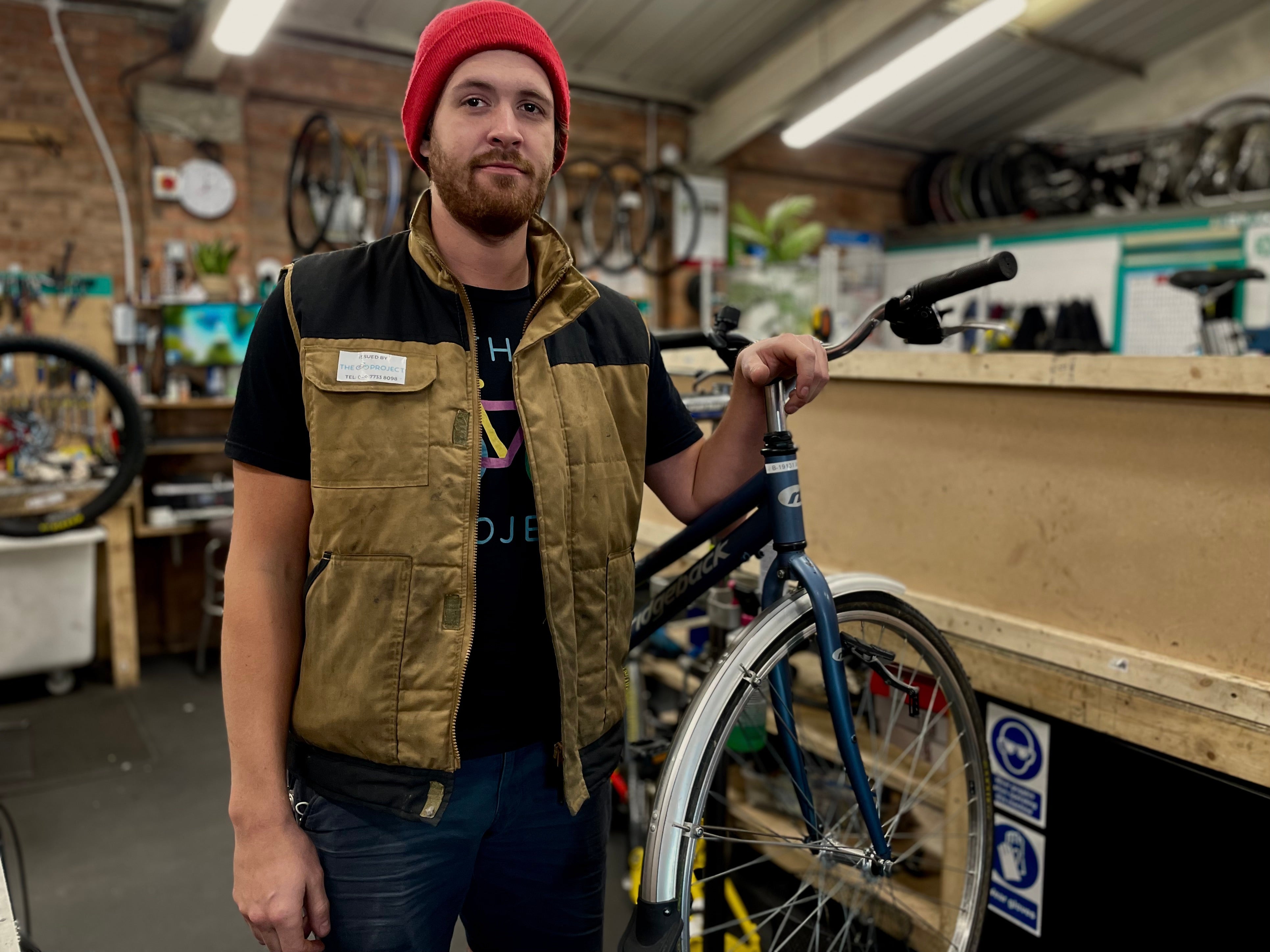
He told me that it was hard during the pandemic because the face to-face part was lost. The bikes were no longer handed over, but delivered and it felt more and more like a numbers game. But it was during the pandemic that perhaps some of their most important work was done. And while they struggled with supply issues, as did the whole bike industry, they managed to get through it and continue to give bikes away.
For Haddad, having a bike in lockdown was essential. Being able to leave the house for exercise and to meet friends allowed him to feel free where otherwise he may have felt trapped. He believes this to have been highly important to his mental health during this period. And the same goes for Adeyemi, who told me that being able to move around by bike in the pandemic didn’t just help her but many others as she was able to cycle to the Lewisham Refugee and Migrant Network to volunteer. Her colleagues often couldn’t make it, either unable or feeling unsafe on public transport in a pandemic. With a bike, Adeyemi was able to make those trips to help other refugees.
Coming out of the worst of the pandemic, Stein wants to expand the charity further. The demand is there, he says, they’ve just got to keep reaching out. For that, they need help. They need people to donate their old bikes and help run pop-ups around the country, a temporary place, even if it’s just a front garden, where people can drop off bikes and the Bike Project team can pick them up. Anything people can do is welcomed, Stein says. There are even fundraising events such as comedy shows and virtual cycling rides. They also sell second-hand bikes and service people’s bikes, then they roll the profits straight back into helping asylum seekers.
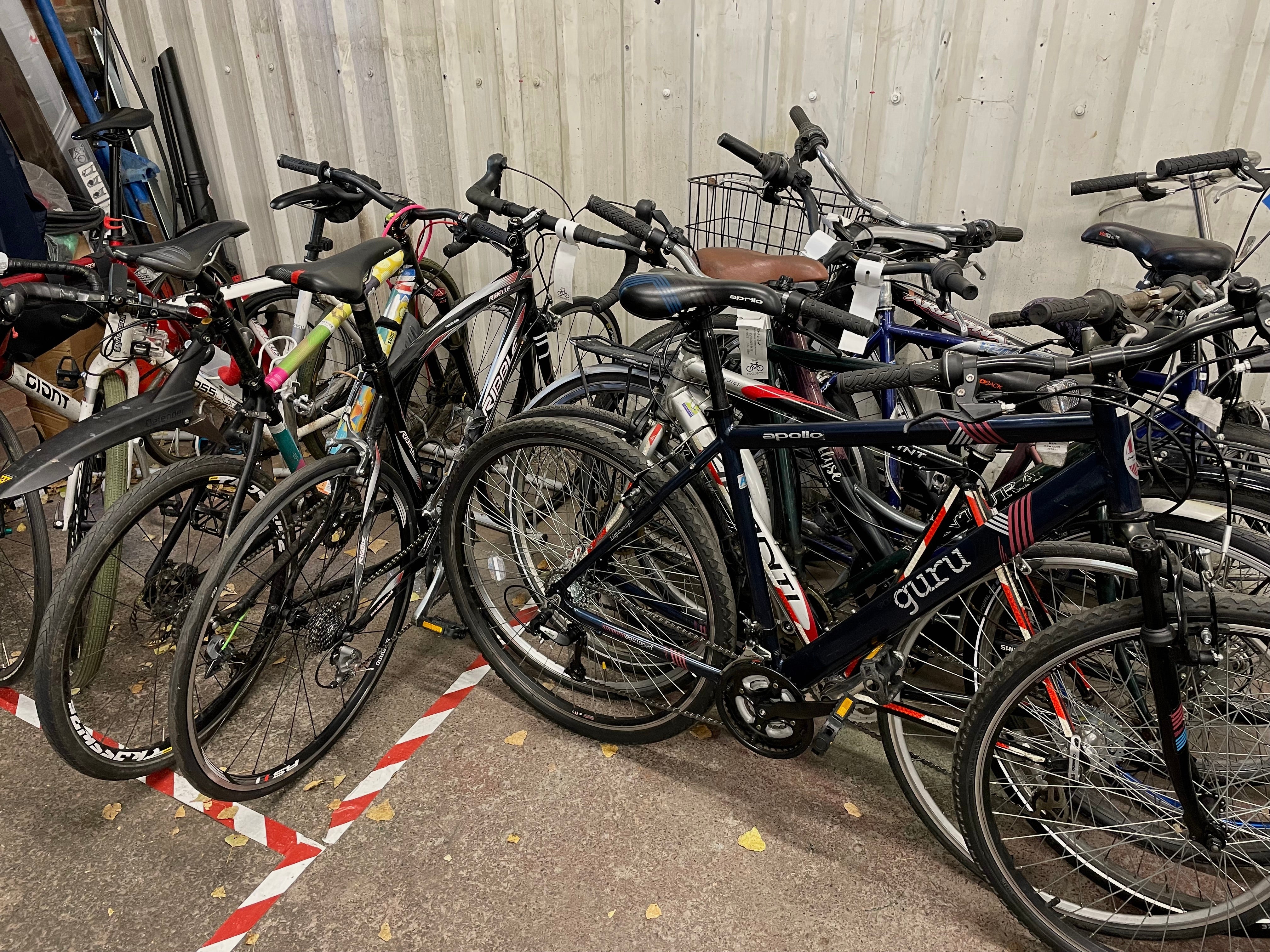
“You know,” Adeyemi said, reflecting on the last couple of years, “I don’t leave my bike outside. My bike is always with me all the time, everywhere I’ve lived since I’ve got my bike. I like looking at it when I wake up in the morning. It’s something to call my own, something that I can put my name on and say it belongs to me and it gives me freedom to move around when I want to. It’s quite reassuring.”
This month the government passed its controversial new Nationality and Borders Bill with a majority of 67, which it says will make the asylum system fairer for those who genuinely need asylum and deter those from desperately crossing the channel.
In practice it allows the government to create a two-tier system, deciding who is worthy of asylum based on how they got here – with people arriving from across the channel not necessarily being given the same rights as those who did not – plus increasing the evidence a refugee must provide to prove they are in genuine need of asylum.
Human rights organisation Amnesty International said in a statement that the law “will create significant obstacles and harms to people seeking asylum in the UK’s asylum system”. It will “largely shut down the UK’s asylum system and punish those fleeing conflict and persecution”. A team of human rights lawyers also believes the bill breaches international and domestic law in no less than 10 ways.

“This bill represents the biggest legal assault on international refugee law ever seen in the UK,” a report from the human rights group Freedom From Torture says.
It is in this environment which charities like the Bike Project exist and why they are so vital to those who do make it and want to start a new life. The project helps them to build a community, make friends and contribute to their new country in the ways that they want to. It is a path to employment and integration, which this government seems reluctant to provide.
“There’s a lot of media hype at the moment around the channel crossings and a lot of the language feels quite dehumanising,” Stein says. “Because I spend a lot of time speaking with refugees, I feel that if you begin to understand why people are coming, it really changes your perspective and I would really encourage people to explore the issue a bit more and try to understand who these people are and why they come and how we can support them and what they want to contribute to Britain.”
Behind every refugee, indeed behind every cyclist, is a story. These are people seeking a better life, and cycling is just one way they can make a real go at beginning to build something new.
I left the workshop under the railway arches, back into the cold, and walked to the road to where my own bike was locked to a nearby rack. As I arrived, a skinny man in his twenties came over to me timidly with his phone in his hand. He showed me the cracked screen. “Excuse me,” he said. “Do you know where I can find this place?” It was a text message from the Bike Project, informing him he had been assigned a bike. “Yes,” I said, “It’s just over there.” I pointed him in the right direction and he thanked me and headed off to pick up his new bike with a big smile on his face. For a cyclist, nothing can beat new bike day, especially when it means so much.
To find out how you can get involved with the Bike Project, donate your old bikes, and help with pop-ups and events, click here: https://www.thebikeproject.co.uk/. To donate to their #GiftOfABike Christmas appeal fund click here: https://christmasfund.raisely.com/




Join our commenting forum
Join thought-provoking conversations, follow other Independent readers and see their replies
Comments